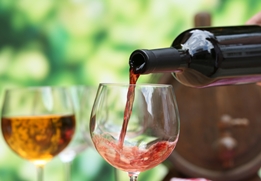24 June 2015
 New research from the UniSA Business School’s Ehrenberg-Bass Institute could help transform the export market for Australian wine, enabling producers and distributors to describe their product more effectively using terms more easily understood by Chinese wine consumers.
New research from the UniSA Business School’s Ehrenberg-Bass Institute could help transform the export market for Australian wine, enabling producers and distributors to describe their product more effectively using terms more easily understood by Chinese wine consumers.
The Chinese Lexicon Project – a two year long research initiative funded by the Australian Grape and Wine Authority (AGWA) and led by Dr Armando Corsi, Dr Justin Cohen and Prof Larry Lockshin, has revealed what terms Chinese consumers use more often when describing a wine, and what Asian fruit and vegetable flavours are equivalent to the typical Western ones used for wines in China.
The project has involved more than 250 Chinese wine consumers from three major Chinese cities – Shanghai, Guangzhou, and Chengdu – being invited to share their responses and describe the taste of a selection of Australian white, red, sparkling and dessert wines.
Participants selected a series of generic wine descriptors as well as choosing from a list of specific fruit and vegetable flavours. These flavours were either Western fruit and vegetables or proposed Chinese equivalents.
The research found that generic wine descriptors, such as “mellow”, “lingering” or “fruity”, were three times more likely to be used than specific wine descriptors by Chinese wine consumers.
The results also revealed that whilst many of the Chinese taste descriptors matched up with the proposed Western equivalents, other didn’t, thus opening more opportunities for research by the team at the Ehrenberg-Bass Institute.
Dr Corsi says that until now wine has been predominantly described in China using Western terminology but such descriptors lack meaning if the consumer has little or no experience of tasting that particular fruit, vegetable or spice.
“Describing a wine as tasting of blueberry is hard to understand if you have never seen or tasted a blueberry before,” Dr Corsi says.
“What this research has provided is evidence of what specific Chinese fruit and vegetable flavours are equivalent to the Western descriptors currently used on wines in China.
“For example, we can now say that the equivalent to Western flavour of blackberry preserve is dried Chinese hawthorns.”
The project also investigated the likeability, willingness to pay and perceived price points of different wine styles. The research showed that what is perceived to be more expensive is not necessarily what is liked the most. In addition to the insights on describing wine, this research can also improve export decisions.
“The full suite of insights should give Australia a competitive advantage in this valuable market,” Dr Corsi says.
“There is also the potential for similar research to be undertaken in other countries to determine what cultural descriptors they would use to describe the taste of different wines.”
For more information, please visit the following website: bit.ly/chineselexiconproject
For interviews:
Dr Armando Corsi, Senior Research Associate, Ehrenberg-Bass Institute office 0403 061 631
Media contact: Will Venn office (08) 8302 0096 email will.venn@unisa.edu.au




